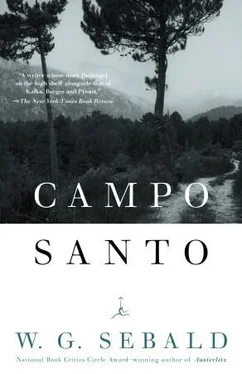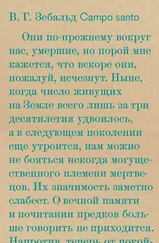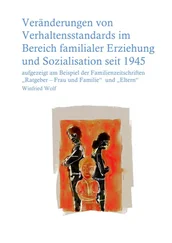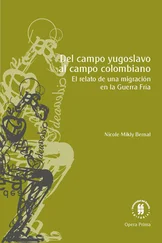Campo Santo is a collection of prose by W. G. Sebald, who died in a road accident on December 14, 2001. His novel Austerlitz had been published shortly before, and Sebald had not yet begun working on a new book since finishing it. However, there was a work that was never finished: in the middle of the 1990s, after the publication of The Rings of Saturn (1995), Sebald began writing a book about Corsica, but then set it aside and turned to writing essays and working on Austerlitz . Parts of this Corsica project were published from 1996 onward as separate texts, in various places; Sebald also used a long section in 2000 as a text for his acceptance speech on the occasion of the award of the Düsseldorf Heine Prize. These texts are collected together for the first time and arranged, in the order of their composition, in the opening section of the present volume: “A Little Excursion to Ajaccio” (“In September last year, during a two-week holiday on the island of Corsica”), “Campo Santo” (“My first walk the day after my arrival in Piana”), “The Alps in the Sea” (“Once upon a time Corsica was entirely covered by forest”), and finally the miniature “La cour de l’ancienne école.” Together, the four Corsican texts, each self-contained, make up admittedly only an incomplete spectrum, which cannot show exactly what the abandoned book would have been like; however, collecting the separate parts makes them appear in a new light, and they also cast light on each other. Sebald’s literary estate, which has not yet been studied and edited, contains no other recent literary works. The Corsican project is the last and unfinished work of a writer’s life that came to a premature end.
The second part of this volume illustrates Sebald’s other side, as essayist and critic. Two collections of essays on Austrian literature, Die Beschreibung des Unglücks (1985) and Unheimiche Heimat (1991), have already been published in German. In addition, there are the later volumes Logis in einem Landhaus (1998) and Luftkrieg und Literatur (1999), including an essay on Alfred Andersch that has provoked much controversy. [1] Published in English as On the Natural History of Destruction, and also including the essays on Jean Améry and Peter Weiss, which in the original German are part of the present volume published by Hanser.
The development shown in these volumes is also reflected in the essays in the present collection, which are chronologically arranged. They have previously appeared in scholarly journals, literary magazines, and the arts sections of newspapers, but are now published in book form for the first time. There are early works of literary criticism — the first, on Peter Handke’s play Kaspar , dates from 1975—which already show Sebald’s concern with such subjects as destruction, mourning, and memory, themes around which his literary work would continue to revolve, and they show the development of his stylistic individuality. The later essays — on Ernst Herbeck, Vladimir Nabokov, Franz Kafka, Jan Peter Tripp, and Bruce Chatwin — written from the early 1990s on, at the same time as the narratives Vertigo, The Emigrants, The Rings of Saturn , and Austerlitz , finally dispense with footnotes, throw the ballast of scholarly references overboard and instead strike the typically Sebaldian note. In “Moments musicaux” and “An Attempt at Restitution,” Sebald’s speeches at the opening of the Munich Opera Festival and the Stuttgart House of Literature in the year of his death, the essayist can no longer be distinguished from the writer. In his final works Sebald practiced the principle to which he had confessed in an interview with Sigrid Löffler in 1993: “My medium is prose, not the novel.” At the end of the volume is Sebald’s speech accepting membership in the German Academy for Language and Literature. Here he tells us of a dream in which he, like Johann Peter Hebel before him, is “unmasked as a traitor to his country and a fraud”—in view of such fears, he says, he regards admission to the Academy as an “unhoped-for form of justification.” Another, perhaps less unanticipated and certainly no less honorable form of justification is the wide acceptance of Sebald’s books by the general reader and the serious discussion of his ideas.
Sven Meyer
A Little Excursion to Ajaccio
In September last year, during a two-week holiday on the island of Corsica, I took a blue bus one day down the west coast to Ajaccio to spend a little time looking around the town, of which I knew nothing except that it was the birthplace of the Emperor Napoleon. It was a beautiful, sunlit day, the branches of the palms in the Place Maréchal-Foch moved gently in a breeze coming in off the sea, a snow-white cruise ship lay in the harbor like a great iceberg, and I wandered through the streets feeling carefree and at ease, now and then going into one of the dark, tunnel-like entrances of buildings to read the names of their unknown inhabitants on the metal letter boxes with a certain rapt attention, trying to imagine what it would be like to live in one of these stone citadels, occupied to my life’s end solely with the study of time past and passing. But since we can none of us really live entirely withdrawn into ourselves, and must all have some more or less significant design in view, my wishful thinking about a few last years with no duties of any kind soon gave way to a need to fill the present afternoon somehow, and so I found myself, hardly knowing how I came there, in the entrance hall of the Musée Fesch, with notebook and pencil and a ticket in my hand.
Joseph Fesch, as I later read on looking him up in my old Guide Bleu , was the son of the late second marriage of Letizia Bonaparte’s mother to a Swiss military officer in Genoese service, and was thus Napoleon’s step-uncle. At the beginning of his career in the church he held a minor ecclesiastical position in Ajaccio. After his nephew had appointed him archbishop of Lyon and envoy to the Holy See, however, he became one of the most insatiable art collectors of his day, a time when the market was positively flooded with paintings and artifacts taken from churches, monasteries, and palaces during the French Revolution, bought from émigrés, and looted in the plundering of Dutch and Italian cities.
Fesch’s aim was no less than to document the entire course of European art history in his private collection. No one knows for certain just how many pictures he actually owned, but the number is thought to be around thirty thousand. Among those that, after his death in 1838, and some devious maneuvers on the part of Joseph Bonaparte as executor of the Cardinal’s will, found their way into the museum especially built for them in Ajaccio are a Madonna by Cosimo Tura, Botticelli’s Virgin Under a Garland , Pier Francesco Cittadini’s Still Life with Turkish Carpet , Spadino’s Garden Fruits with Parrot , Titian’s Portrait of a Young Man with a Glove , and a number of other wonderful paintings.
The finest of all, it seemed to me that afternoon, was a picture by Pietro Paolini, who lived and worked in Lucca in the seventeenth century. It shows a woman of perhaps thirty against a deep black background which lightens to a very dark brown only toward the left-hand side of the painting. She has large, melancholy eyes and wears a dress the color of the night, which does not stand out from the surrounding darkness even by suggestion and is thus really invisible, and yet it is present in every fold and drape of its fabric. She wears a string of pearls around her neck. Her right arm protectively embraces her small daughter, who stands in front of her turning sideways, toward the edge of the picture, but with her grave face, upon which the tears have only just dried, turned toward the observer in a kind of silent challenge. The little girl wears a brick-red dress, and the soldier doll hardly three inches high which she is holding out to us, whether in memory of her father who has gone to war or to ward off the evil eye we may be casting on her, also wears red. I stood in front of this double portrait for a long time, seeing in it, as I thought at the time, an annulment of all the unfathomable misfortune of life.
Читать дальше












